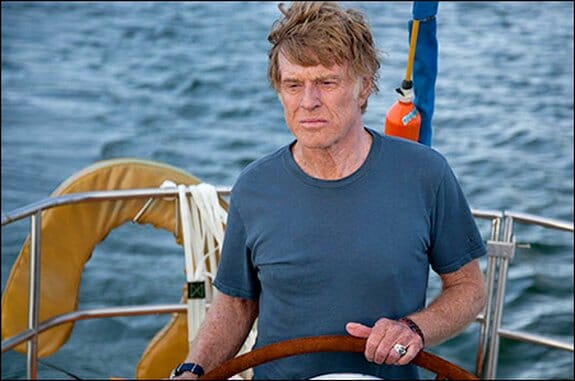All Is Lost

The parallels between Gravity and All Is Lost are obvious: A lone protagonist survives the destruction of her or his space shuttle/boat, loses all communication with Earth/land and must navigate solo through the vastness of space/the ocean to get back home. But in some ways, writer-director J.C. Chandor’s story about an old man and the sea is a bolder film, eschewing backstory, sentimentality and even dialogue in favor of a primal tale of survival.
Robert Redford, credited only as “Our Man,” speaks just a handful of times in the movie, the first a voiceover in which he’s penning a letter. “I’m sorry,” he writes. “I tried…goodbye.” In Gravity, a dead daughter gives Sandra Bullock’s character the will to live. Here, we don’t know to whom the message is addressed, and it lacks personal details that would tell us anything about him other than that he probably does love someone, somewhere. He wears a silver and turquoise ring on his left hand. Is he married? He also bears leather and string bracelets on his wrists. Gifts from his grandchildren? We’ll never know. And we don’t need to, for the human drive to survive is what fuels this story of resilience and perseverance.
After this brief foreshadow, the script kicks back to eight days earlier when, sailing solo 1,700 nautical miles from the Sumatra Straits in the Indian Ocean, Our Man is woken by a crash and the rush of water flooding his cabin. His yacht has struck a Chinese shipping container full of shoes, leaving a gash in the side of the Virginia Jean. Diligently and methodically, he goes about dislodging his boat, mending the breach and salvaging his equipment. But without his electronics to communicate or navigate, he sails right into the path of a violent storm. The obstacles to his survival—some pure chance, some human error—pile on.
-

-

-

-

- Curated Home Page Articles By Test Admin October 21, 2025 | 3:10pm
-

- Curated Home Page Articles By Test Admin October 21, 2025 | 2:57pm
- Urls By Test Admin October 21, 2025 | 2:57pm
- Curated Home Page Articles By Test Admin October 21, 2025 | 2:55pm
-

-

-

-

-

-

-

-

-

-

-

-

-

-

-

-

-

-

-

-

-

-

-

-

-

-

-

-

-

-

-




































